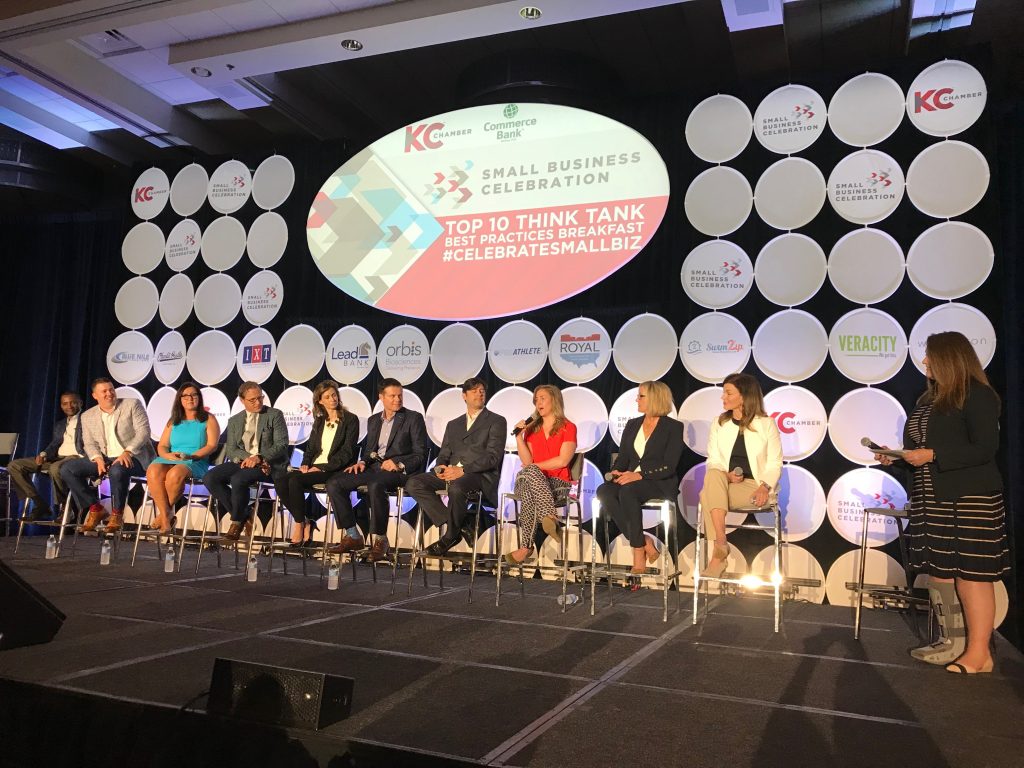Ten local small business leaders shared nuggets of wisdom May 3 at the Top 10 Think Tank.
The event is part of the Greater Kansas City Chamber of Commerce Top 10 Small Business award program. Chief executives of each of the top companies convened for a panel to talk about strategies that have made their businesses successful.
The chamber’s Small Business Celebration will culminate May 24 with a luncheon, where the top small business of the group will receive the Mr. K Award.
As part of the discussion of best practices, some companies talked about projects and initiatives that have been key to their businesses.
Bradley Shyver, CEO of Royal Mechanical Services Inc., described working with Sprint in Puerto Rico shortly after Hurricane Maria in 2017 to create housing for engineers who were working to restore mobile phone service.
Scott Hedrick, CEO of Pro Athlete Inc., explained how his company — an online seller of baseball bats and gloves — took four years to study and test how to exist in the same marketplace as Amazon.com. Through that process, it has created a plan that has significantly increased sales since Black Friday in 2017.
Lead Bank’s CEO and vice chairman Josh Rowland described how his bank’s commitment to the community led it to create the For Change Initiative, in which Lead Bank works with contractors working on vital infrastructure projects for Kansas City, Mo., to provide working capital. Through the program, Lead Bank has extended $12 million in credit to local diverse and disadvantaged businesses.
Other panelists talked about traits that have helped their businesses attain success.
Angela Hurt, founder and CEO of Veracity
“We went with an approach that said we would be so transparent with the client and so extremely real that it kind of became our differentiator. … Unfortunately, in the technology consulting space, a lot of people can truly be taken advantage of.”
Henok Tekeste, president of Blue Nile Contractors
Tekeste spoke about his experience as an Ethiopian immigrant who came to the U.S. in 1999.
“By me being successful in business, it empowers others, gives hope to others that this kind of thing is possible — just being here and being successful as a business.”
Karen Duff, CEO of International Express Trucking Inc.
Duff recalled the story of a former employee, a Vietnamese immigrant, who sought her mentorship.
“He came to me after working for five years and said, ‘Hey, I want to be like IXT. Can you help me?’ Well, OK, you’re going to compete against me, but yeah, I’ll help you. So I helped him. I still mentor him — he calls me probably once a week. He now has 30 drivers and entrepreneurs that work underneath him. I believe that you should build people through leadership, and that will result in entrepreneurship.”
Maria Flynn, CEO of Orbis Biosciences
“I think another part that’s special to our culture is that we’re not afraid to put somebody on the field that hasn’t played that position before, but we have a lot of belief in them and their abilities and their attitude that they’ll be successful. It relates back to a quote of Mr. K’s that we really like: The more you expect out of people, the more they rise to meet your expectations.”
Joan Wells, co-founder and CEO of Wellington
For Wellington, which produces large events, post-9/11 was a difficult time in the industry.
“We all know that bad times become better. And when better times occur, you want to be that person who was there during the tough times, who was strategizing for the brilliant future, who was a true partner during the dark times and not just waiting for the good times and the flush budgets.”
Betsy Johnson, co-founder and CEO of SwimZip
SwimZip appeared on the television venture-funding show “Shark Tank” about four years ago. The company sells sun-protective swimwear.
“They loved us when we applied, and I think it was because of our network and all the friends we’ve made. … It’s really how we run our business is connections.”
Chase McAnulty, founder and CEO of Charlie Hustle LLC
“I think the most special thing about Charlie Hustle is we have a voice — we’ve created this kind of awareness. And with that voice comes a lot of responsibility. This KC heart thing has made a lot of people happy. So I think we have a duty to make a positive impact on lives in this world as long as we have this voice.”

